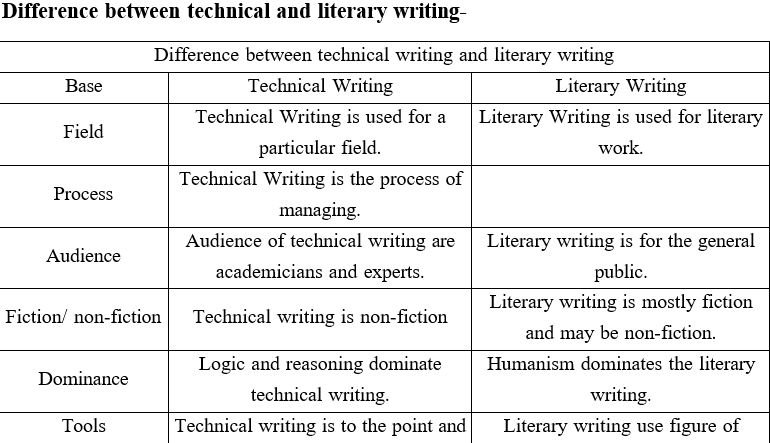Technical Writing-
In the 20th century, technical writing had its place and was officially recognized. Technical writing was in high demand and became an official job title during World War II. Complex writing machines were being invented. Universities, library, engineering, military hardware, aerospace led to technical writing. With the growing popularity of computers the field of technical writing also grew.
Technical writing is significantly different from other types of writing, like narrative, because technical writing is intended to impart some specific skill or ability. This style of writing has a very different purpose and different characteristics according to the purpose than other writing styles such as creative writing. Technical writing is done to educate, informing, or directing someone on how to do something.
Technical writing required strong technical skill. It also requires a writer to examine the audience extensively.
Definition of technical writing-
The traditional definition of technical writing is: “Technical writing is the practice of documenting processes, such as software manuals or instructional materials. Traditionally, it was limited to user manuals of some sort.”
Today technical writing encompasses all documentation of complex technical processes. It includes reports, executive summary statements and briefs. Each time technical information is conveyed in writing at work, it is, by definition, technical writing.
Characteristics of Technical writing-
- It is straight forward and clear.
- Use of computer is important for technical documentation.
- Technical writing is done for a specialized topic.
- Providing instructions about how to do a particular task.
- Technical writing covers a wide range of genres and technologies like press release, memo, reports, etc.
- Need for awareness about the audience’s existing knowledge.
- Technical writing takes much more time to write.
- Technical writing is detailed and informative.
- Technical writing is done in a concise and well-structured manner.
Genres of Technical writing-
This type of writing covers different styles depending on the audience and information. These styles include proposals, procedures and instructions, press release, e-mail, letters memoranda, resume, job application, case study, etc.
Tips for good Technical Writing-
If a writer keeps in mind the following tips, he can easily and quickly explain any complex piece of writing:
- Know about your audience for whom writing is done because in technical writing, a complex language is used and many abbreviations, acronyms are directly applied to such a field according to the audience.
- Use an impersonal style.
- A writer must write in simple and straight forward language which a reader can understand easily.
- Collection of information must be analysed thoroughly.
- Information must be arranged into an understandable and conceivable format.
- Check repeatedly after writing. It should not be lengthy and monotonous for the reader.
Skills needed for Technical Writing-
A successful technical writing has to have set of skills like good written communication skill, document design skill, fluency with digital tools, graphic software knowledge, screen capture tool, web developing tools, component management systems, and desktop publishing tools or word process, abbreviations, acronyms and technical language that make a technical writing efficient.
Literary writing-
Literary writing is creative writing and used in fiction. For this writing, personal motivation of a writer is essential. It is an art and a depiction of thoughts and views in writing as poem, story, novel and any form of literature. Literature word is derived from the Latin word meaning “writing formed with letters.” Literature is a form of human expression which is organized and written down in expressive manner. Literature also functions more broadly in society as a means of both criticizing and affirming cultural values.
Definition of literary writing-
Definition of the word literature tends to be circular. The 11th edition of Merriam-Webster’s Collegiate Dictionary considers literature to be “Writing having excellence of form or expression and expressing ideas of permanent or universal interest.”
The 19th-century critic Walter Pater referred to “The matter of imaginative or artistic literature” as a transcript, not of mere fact, but of fact in its infinitely varied forms.”
According to thesaurus.com, “Literature is writing in which expression and form, in connection with ideas of permanent and universal interest, are characteristics or essential features, as poetry, novels, history, biography, and essays.”
Features of Literary Writing-
- It has a narrative element.
- Literary writing is the reflection of ideas, passions of human being.
- It is an art, having creativity.
- It paints a picture of author’s feelings like a real world.
- Objective of literary writing is to provide information to the audience.
- It is done as an intellectual and imaginative work.
Functions of literary writing-
· Knowledge Sharing: Through literature, the writer shares the knowledge, information, thoughts, and ideas with audience creatively.
· Entertainment: Literary writing gets the wonder feel to the audience. The writer presents his idea in an influence manner.
· Shaping the Aesthetic Sense: Literature describes behaviour, attitude and all in an aesthetic sense. It helps us to notice everything beautiful around us.
· Self- Development: Through literature, an author helps himself with new ideas and information. Readers inhale all those qualities and knowledge what he reads in books and magazines.
· Transformation: A good literature can transform a reader’s behaviour, attitude and bad memories into good and beautiful. The audience get inspired with it.
Genres of literary writing-
The styles of literary writing include the way to write literature or can be said in other words ‘style’ in which it is performed. Normally, these genres are familiar: Poetry, Prose, Drama, essay, fable, and fiction and non-fiction are often divided into sub-genres.
Steps to be Taken While Writing a Literature
- To understand the purpose of literary writing.
- To decide the format.
- Execute the plan of how to write and what you analyse to write.
- Now start writing.
- After completion of literary writing, edit your work.
